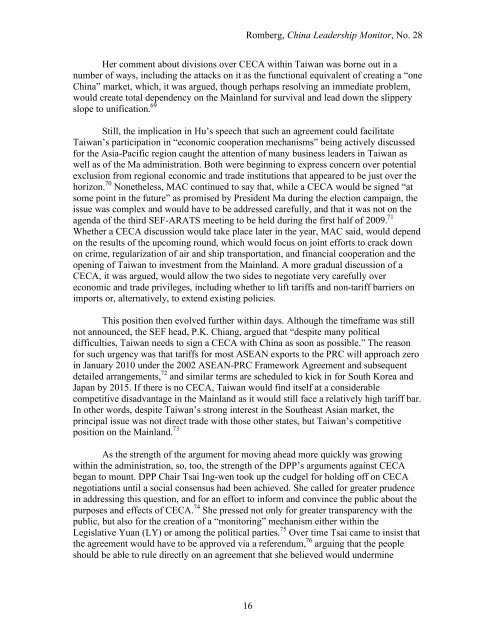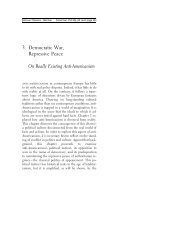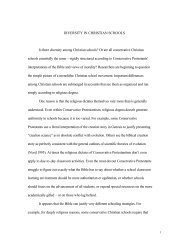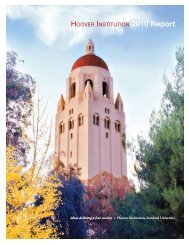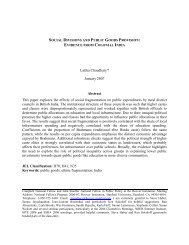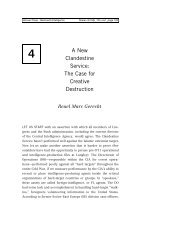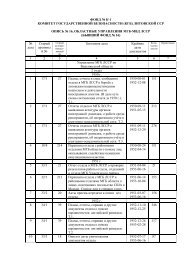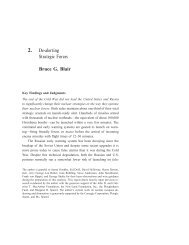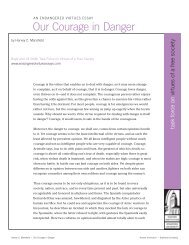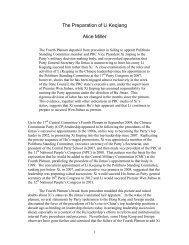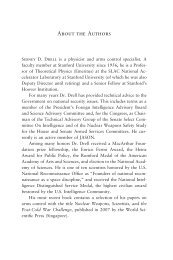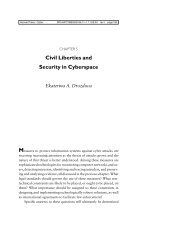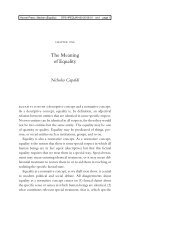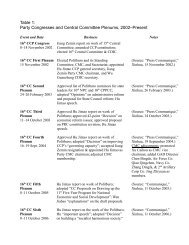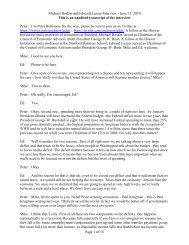Cross-Strait Relations: First the Easy, Now the Hard - GEES
Cross-Strait Relations: First the Easy, Now the Hard - GEES
Cross-Strait Relations: First the Easy, Now the Hard - GEES
You also want an ePaper? Increase the reach of your titles
YUMPU automatically turns print PDFs into web optimized ePapers that Google loves.
Romberg, China Leadership Monitor, No. 28<br />
Her comment about divisions over CECA within Taiwan was borne out in a<br />
number of ways, including <strong>the</strong> attacks on it as <strong>the</strong> functional equivalent of creating a “one<br />
China” market, which, it was argued, though perhaps resolving an immediate problem,<br />
would create total dependency on <strong>the</strong> Mainland for survival and lead down <strong>the</strong> slippery<br />
slope to unification. 69<br />
Still, <strong>the</strong> implication in Hu’s speech that such an agreement could facilitate<br />
Taiwan’s participation in “economic cooperation mechanisms” being actively discussed<br />
for <strong>the</strong> Asia-Pacific region caught <strong>the</strong> attention of many business leaders in Taiwan as<br />
well as of <strong>the</strong> Ma administration. Both were beginning to express concern over potential<br />
exclusion from regional economic and trade institutions that appeared to be just over <strong>the</strong><br />
horizon. 70 None<strong>the</strong>less, MAC continued to say that, while a CECA would be signed “at<br />
some point in <strong>the</strong> future” as promised by President Ma during <strong>the</strong> election campaign, <strong>the</strong><br />
issue was complex and would have to be addressed carefully, and that it was not on <strong>the</strong><br />
agenda of <strong>the</strong> third SEF-ARATS meeting to be held during <strong>the</strong> first half of 2009. 71<br />
Whe<strong>the</strong>r a CECA discussion would take place later in <strong>the</strong> year, MAC said, would depend<br />
on <strong>the</strong> results of <strong>the</strong> upcoming round, which would focus on joint efforts to crack down<br />
on crime, regularization of air and ship transportation, and financial cooperation and <strong>the</strong><br />
opening of Taiwan to investment from <strong>the</strong> Mainland. A more gradual discussion of a<br />
CECA, it was argued, would allow <strong>the</strong> two sides to negotiate very carefully over<br />
economic and trade privileges, including whe<strong>the</strong>r to lift tariffs and non-tariff barriers on<br />
imports or, alternatively, to extend existing policies.<br />
This position <strong>the</strong>n evolved fur<strong>the</strong>r within days. Although <strong>the</strong> timeframe was still<br />
not announced, <strong>the</strong> SEF head, P.K. Chiang, argued that “despite many political<br />
difficulties, Taiwan needs to sign a CECA with China as soon as possible.” The reason<br />
for such urgency was that tariffs for most ASEAN exports to <strong>the</strong> PRC will approach zero<br />
in January 2010 under <strong>the</strong> 2002 ASEAN-PRC Framework Agreement and subsequent<br />
detailed arrangements, 72 and similar terms are scheduled to kick in for South Korea and<br />
Japan by 2015. If <strong>the</strong>re is no CECA, Taiwan would find itself at a considerable<br />
competitive disadvantage in <strong>the</strong> Mainland as it would still face a relatively high tariff bar.<br />
In o<strong>the</strong>r words, despite Taiwan’s strong interest in <strong>the</strong> Sou<strong>the</strong>ast Asian market, <strong>the</strong><br />
principal issue was not direct trade with those o<strong>the</strong>r states, but Taiwan’s competitive<br />
position on <strong>the</strong> Mainland. 73<br />
As <strong>the</strong> strength of <strong>the</strong> argument for moving ahead more quickly was growing<br />
within <strong>the</strong> administration, so, too, <strong>the</strong> strength of <strong>the</strong> DPP’s arguments against CECA<br />
began to mount. DPP Chair Tsai Ing-wen took up <strong>the</strong> cudgel for holding off on CECA<br />
negotiations until a social consensus had been achieved. She called for greater prudence<br />
in addressing this question, and for an effort to inform and convince <strong>the</strong> public about <strong>the</strong><br />
purposes and effects of CECA. 74 She pressed not only for greater transparency with <strong>the</strong><br />
public, but also for <strong>the</strong> creation of a “monitoring” mechanism ei<strong>the</strong>r within <strong>the</strong><br />
Legislative Yuan (LY) or among <strong>the</strong> political parties. 75 Over time Tsai came to insist that<br />
<strong>the</strong> agreement would have to be approved via a referendum, 76 arguing that <strong>the</strong> people<br />
should be able to rule directly on an agreement that she believed would undermine<br />
16


